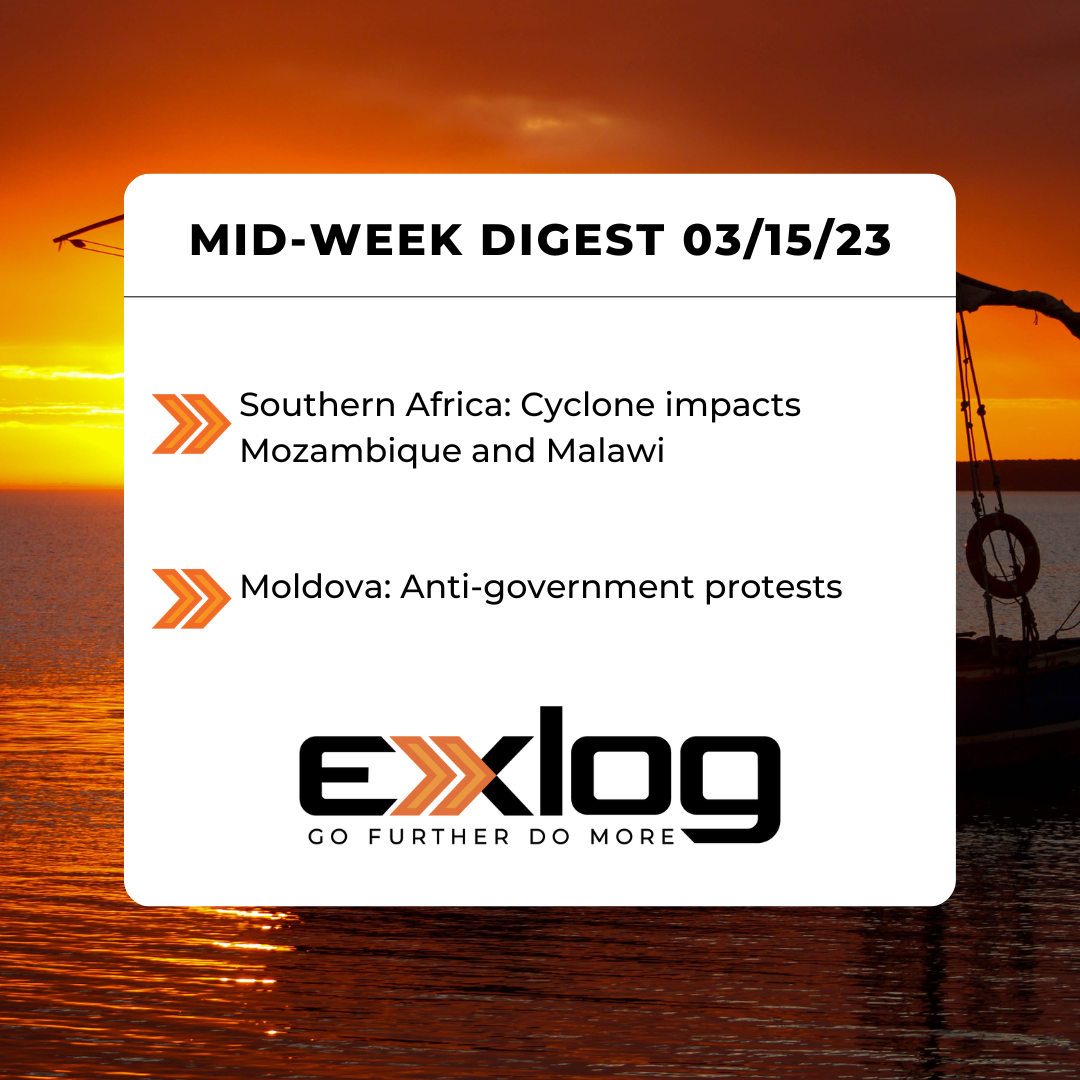Cyclone Freddy impacts Mozambique and Malawi and anti-government protests in Moldova
Southern Africa: Cyclone leaves casualties, widespread damage
Tropical Cyclone Freddy has brought heavy landfall and 150 mph (240 kph) winds to Mozambique and Malawi since March 11, causing casualties, internal displacement, and extensive damage to infrastructure and private property. The cyclone has killed at least 225 people and displaced nearly 57,000 across both countries. In Malawi, President Lazarus Chakwera declared a State of Disaster in the Southern Region on March 13 due to the storm’s impacts to travel, medical, power, and communications infrastructure; the southern districts of Nsanje, Chikwawa, and Blantyre are among the hardest-hit areas. National carrier Malawi Airlines has canceled flights to Blantyre until further notice, although it remains unclear whether the Chileka International Airport resumed normal operations; open sources show scheduled flights as of March 15. Mozambique’s Zambezia province experienced the most destruction in that country, although the cyclone also affected the central provinces of Sofala, Manica, and Tete, as well as the northern province of Niassa. According to the National Institute for Disaster Management (INGD), nearly 2,000 houses have been damaged or destroyed. Mozambique Electricity announced on March 11 that more than 100,000 customers in central and northern regions lost power, although electricity supply has been partially restored in the intervening days. Flooding also inflicted minor damage to the Quelimane Airport, temporarily disrupting air travel; open sources indicate that several local flights have been scheduled as of March 15. As of March 15, the cyclone is dissipating; however, heavy rain forecast in southern Malawi and central-northern Mozambique over the next 48 hours is likely to trigger additional flooding and mudslides and hamper ongoing relief and rescue operations.
Moldova: Unrest exposes anti-west sentiment, likely Russian influence
Anti-government demonstrations backed by a pro-Kremlin opposition party swept central Chisinau on March 12, triggering localized travel disruptions in central neighborhoods and highlighting political polarization in the country. Security forces blocked several roads to restrict access to major government buildings, temporarily interrupting traffic in the affected area. The demonstrations were largely peaceful, although minor skirmishes between protesters and police resulted in the arrest of at least 54 people, including 21 minors. Moldovan authorities have alleged that a Russia-backed group infiltrated the demonstrations to generate “mass disorder,” as the March 12 protest was one of several organized in recent weeks by a group supported by the small pro-Moscow Shor party. Moldovan security forces arrested seven suspects following the rallies in connection with an alleged Russia-backed plot to incite civil unrest. Authorities also registered four hoax bomb threats – including one at the Chisinau International Airport – on March 13, claiming they were deliberately intended to destabilize the country; the airport resumed normal operations following a two-hour evacuation. Moldova’s pro-Europe government has faced mounting political and economic pressure from Moscow since the start of the Russia-Ukraine conflict in February 2022. The conflict has also contributed to rising inflation and costs of living – exacerbated by Russia reducing gas supplies to the country over the past year – that have fueled grievances expressed during the recent protests. In an apparent attempt to prevent further unrest and disorder, immigration officials denied entry to 182 foreign nationals suspected of having ties with Russia in the past week, including one individual allegedly connected to the Russian paramilitary organization Wagner Group. However, Moscow’s entrenched influence in the region – exemplified by the Russian military base housing 1,500 troops in the breakaway state of Transnistria – suggests that such isolated efforts will likely be inadequate. Even if Moldovan authorities were to succeed in expelling Russian forces from Transnistria (as they recently called for) and preventing the arrival of potential saboteurs, destabilizing conditions would almost certainly persist at least as long as the conflict continues in neighboring Ukraine. Given the low likelihood of a resolution to the war in the short-to-medium term, a deterioration of the economic climate in Moldova is plausible, which will likely result in additional protests and related operational disruptions.


